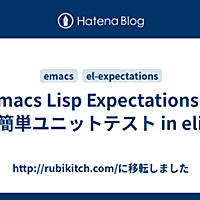expectations
(コンピュータ)
【えくすぺくてーしょんず】
Rubyの新しいテスティングフレームワークのひとつ。最小主義なのが特徴でコンパクトでエレガントにテストが記述できる。作者Jay Fields氏のユニットテストの信念がとてもよく現れている。
- ひとつの文法しか用意していない。assertionのメソッドを使い分けなくてすむ。
- 『one assertion per test』という考え方を強制している。ひとつのテストにはひとつのassertion。だからこそ、一度のテストですべてのassertionを実行してくれる。
- setupとteardownがないので初期化や後片付けもテストメソッドの中に記述する。DRY原則…そんなの関係ねぇ!
- Mochaというモックフレームワークとの連携がとれているので、振舞いベースのテストも同じ文法で書ける。
- テストが明確なのでテスト名すらない。
インストール
$ gem install expectations
記述例
READMEより抜粋。
中のexpectメソッドの引数が空気を読んでくれるため、コンパクトに書ける。
require File.dirname(__FILE__) + "/test_helper"
Expectations do
# State based expectation where a value equals another value
expect 2 do
1 + 1
end
# State based expectation where an exception is expected. Simply expect the Class of the intended exception
expect NoMethodError do
Object.no_method
end
# Behavior based test using a traditional mock
expect mock.to.receive(:dial).with("2125551212").times(2) do |phone|
phone.dial("2125551212")
phone.dial("2125551212")
end
# Behavior based test using a stub
expect stub.to.receive(:dial).with("2125551212").times(2) do |phone|
phone.dial("2125551212")
phone.dial("2125551212")
end
# Behavior based test using a stub_everything
expect stub_everything.to.receive(:dial).with("2125551212").times(2) do |phone|
phone.dial("2125551212")
phone.dial("2125551212")
end
# Behavior based test on a concrete mock
expect Object.to.receive(:deal) do
Object.deal
end
# State based test utilizing a stub
expect 2 do
stub(:two => 2).two
end
# State based test utilizing a concrete mock
expect 2 do
Object.expects(:bar).returns 2
Object.bar
end
# Behavior based test utilizing a stub and a concrete mock
expect 1 do
Object.expects(:give_me_three).with(3).returns 1
Object.give_me_three(stub(:three=>3).three)
end
# State based test matching a Regexp
expect /a string/ do
"a string"
end
# State based test checking if actual is in the expected Range
expect 1..5 do
3
end
# State based test to determine if the object is an instance of the module
expect Enumerable do
[]
end
# State based test to determine if the object is an instance of the class
expect String do
"a string"
end
# State based test to determine if the modules are the same
expect Enumerable do
Enumerable
end
# State based test to determine if the classes are the same
expect String do
String
end
# State based test with XML strings, whitespace between tags is ignored
expect xml("<a><foo>bar</foo></a>") do
"<a>\n\t<foo>bar</foo> \n</a>"
end
# State based test with XML strings, whitespace between tags is ignored
expect xml(<<-eos) do
<one>
<two>
<three>4</three>
<five> 6 </five>
</two>
</one>
eos
"<one><two><three>4</three>
<five> 6 </five>
</two></one>"
end
# this is normally defined in the file specific to the class
klass = Class.new do
def save(arg)
record.save(arg)
end
end
# State based delegation test
expect klass.new.to.delegate(:save).to(:record) do |instance|
instance.save(1)
end
# this is normally defined in the file specific to the class
klass = Class.new do
attr_accessor :started
end
# State based fluent interface boolean test using to be
expect klass.new.to.be.started do |process|
process.started = true
end
# this is normally defined in the file specific to the class
klass = Class.new do
attr_accessor :finished
end
# State based fluent interface boolean test using to have
expect klass.new.to.have.finished do |process|
process.finished = true
end
end
このタグの解説について
この解説文は、すでに終了したサービス「はてなキーワード」内で有志のユーザーが作成・編集した内容に基づいています。その正確性や網羅性をはてなが保証するものではありません。問題のある記述を発見した場合には、お問い合わせフォームよりご連絡ください。関連ブログ
ネットで話題
もっと見る62ブックマークBehat — a php framework for autotesting your business expectations.A php framework for autotesting your business expectations. Behat is an open source Behavior-Driven Development framework for PHP. It is a tool to support you in delivering software that matters through continuous communication, deliberate discovery and test-automation. Focused on communication B... behat.org
behat.org
31ブックマークBuilt in matchers - RSpec Expectations - RSpec - Relishrspec-expectations ships with a number of built-in matchers. Each matcher can be used with expect(..).to or expect(..).not_to to define positive and negative expectations respectively on an object. Most matchers can also be accessed using the (...).should and (...).should_not syntax; see using sh... relishapp.com
relishapp.com









